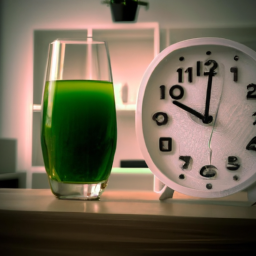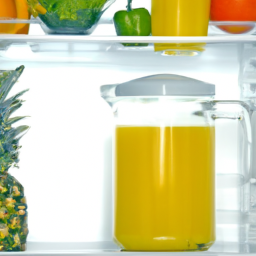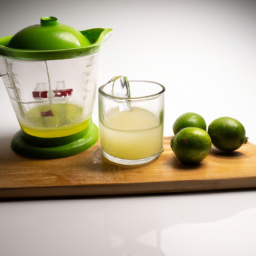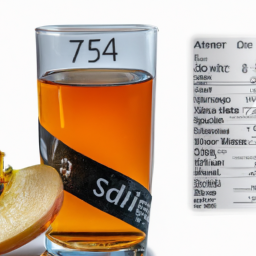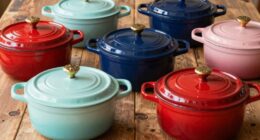As someone who loves drinking fresh juice, I often think about how long it will last before it goes bad. I’ve heard different opinions on this matter – some say it’s best to drink it immediately, while others claim it can remain fresh for up to a week.
So, I decided to do some research to get to the bottom of this debate and find out the truth about how long fresh juice can actually last.
There are several factors that can affect the shelf life of fresh juice, including the type of fruit or vegetable used, the juicing method, and the storage conditions. While some types of juice may last longer than others, all fresh juice is susceptible to oxidation, which can cause it to spoil quickly.
In this article, we’ll explore how oxidation affects the shelf life of fresh juice, as well as some tips for extending its shelf life and storing it safely.
Key Takeaways
- The shelf life of fresh juice is affected by temperature, air exposure, type of fruit/vegetable used, and oxidation.
- Preventing oxidation can be achieved by adding antioxidants, drinking juice soon after juicing, adding lemon juice, and storing in an airtight container in the fridge.
- Signs of spoilage include sour/off smell, mold, changes in color, and slightly fizzy texture.
- Safety considerations for making fresh juice include washing produce thoroughly, using clean equipment and surfaces, consuming juice immediately after making it, and being aware of bacteria growth as a major factor.
Factors That Affect the Shelf Life of Fresh Juice
Hey, did you know that the shelf life of your fresh juice can be affected by factors like temperature, air exposure, and the type of fruit or vegetable you use? All of these factors can significantly impact the freshness of your juice, and it’s important to understand how they work to ensure that you’re getting the most out of your drink.
One of the most significant factors affecting freshness is temperature. When you expose your juice to high temperatures, it can break down faster, which can lead to a loss in nutrients and flavor.
Additionally, air exposure is another factor that can impact freshness. When your juice is exposed to air, it can oxidize, which can lead to a change in color, flavor, and texture.
Despite these factors, the benefits of consuming fresh juice are numerous, and understanding how to properly store your juice can help you get the most out of your drink.
Understanding oxidation and how it impacts the shelf life of your juice is crucial, so let’s take a closer look.
Understanding Oxidation
Imagine you’ve just cut open a ripe apple and left it on the counter, slowly watching it turn brown – that’s oxidation, and it’s the same process that affects your freshly made juice over time.
When juice is exposed to air, the oxygen in the air reacts with the juice’s natural enzymes, causing it to break down and lose its nutritional value. The longer your juice is exposed to air, the more oxidation occurs, and the quicker it will spoil.
Preventing oxidation is key to extending the shelf life of your fresh juice. One way to do this is by adding antioxidants to your juice. Antioxidants are compounds that help to neutralize free radicals, which are unstable molecules that can cause damage to cells and contribute to aging and disease.
Some fruits and vegetables that are high in antioxidants include berries, citrus fruits, leafy greens, and carrots. Adding these ingredients to your juice can help to slow down the oxidation process and keep your juice fresher for longer.
To further extend the shelf life of your fresh juice, there are other tips and tricks to follow.
Tips for Extending the Shelf Life of Fresh Juice
If you want to keep your juice detox or weight loss plan going strong, you’ll need to take some extra care when storing your juice. The first and most important step is to drink your juice as soon as possible after juicing. Fresh juice is highly perishable and will begin to oxidize as soon as it comes into contact with air. This is why you shouldn’t make more juice than you can drink in one sitting.
To extend the shelf life of your fresh juice, you can add a little bit of lemon juice to the mixture. The citric acid in the lemon juice helps to slow down the oxidation process, keeping your juice fresher for longer. You can also store your juice in an airtight container in the refrigerator. This will help to slow down the oxidation process and keep your juice fresh for up to three days.
However, if you want your juice to taste its very best, it’s always best to drink it as soon as possible after juicing. With these tips in mind, let’s move on to how to store fresh juice.
How to Store Fresh Juice
When it comes to storing fresh juice, there are a few key considerations to keep in mind. First, you’ll want to decide whether to keep your juice in the fridge or the freezer.
Next, you’ll need to choose the right type of container – glass or plastic – to ensure optimal freshness. Finally, there are some best practices you can follow to make sure your juice stays as fresh as possible for as long as possible.
Let’s take a closer look at each of these factors.
Fridge vs Freezer
You can extend the shelf life of your fresh juice by storing it in the fridge or freezer. Both options have their pros and cons, depending on your priorities and needs. Here are some factors to consider when deciding whether to keep your juice in the fridge or freezer:
-
Optimal temperature for storing fresh juice: The ideal temperature range for storing fresh juice is between 32°F and 40°F. This is the temperature range of a typical refrigerator, which makes it a convenient option for most people. However, if you want to keep your juice for longer than a few days, you may want to consider freezing it.
-
Fridge vs freezer: Storing your juice in the fridge will keep it fresh for up to 3 days. This means that you can make a large batch of juice and enjoy it throughout the week. However, if you don’t plan on drinking your juice within a few days, you may want to freeze it. Frozen juice can last up to 6 months, which means you can stock up and have juice on hand whenever you want it.
-
Pros and cons of fridge storage: One advantage of storing your juice in the fridge is that it’s convenient and accessible. You can easily pour yourself a glass of juice whenever you want it. However, fridge storage can take up valuable space, especially if you’re making large batches of juice.
-
Pros and cons of freezer storage: Freezing your juice is a great way to extend its shelf life and ensure that you always have juice on hand. However, it can be time-consuming to thaw the juice when you want to drink it. Additionally, freezing can alter the texture and taste of the juice, so it may not be the best option if you’re very particular about the quality of your juice.
When it comes to storing fresh juice, the container you use is just as important as the storage method. Glass and plastic containers each have their own advantages and disadvantages, which we’ll explore in the next section.
Glass vs Plastic Containers
Glass and plastic containers offer different benefits and drawbacks for storing your favorite juices. Glass containers are known for their durability and ability to keep the juice fresh for longer periods of time. They are also non-reactive, so they won’t alter the flavor of your juice. However, glass containers can be heavy and breakable, making them less convenient for on-the-go lifestyles.
On the other hand, plastic containers are lightweight and shatterproof, making them ideal for those who need to take their juice on the go. However, plastic can be more porous than glass, allowing air and bacteria to enter the container and potentially spoil the juice faster. Additionally, plastic containers can be less durable and may need to be replaced more frequently. When it comes to the environmental impact, glass is more easily recyclable and less harmful to the environment than plastic.
In order to ensure the longest shelf life for your fresh juice, it is important to choose the right container for your needs and to follow best practices for storing.
Best Practices for Storing
To maximize the shelf life of your favorite juices, it’s essential to store them properly and adhere to recommended guidelines. First, it’s important to keep your juice refrigerated at all times, ideally at a temperature of 40°F or below. This will help slow down the growth of any harmful bacteria that may lead to spoilage.
Additionally, you should always keep your juice in an airtight container, whether it’s glass or plastic. Exposure to air can cause your juice to oxidize, leading to a loss of flavor and nutrients. Finally, try to consume your juice within 3-4 days of opening the container to ensure its freshness.
By following these guidelines for juice storage, you’ll be able to preserve the quality and flavor of your favorite drinks for as long as possible. As important as it is to store your juice properly, it’s also crucial to know the signs of spoilage.
In the next section, we’ll discuss how to identify when your juice has gone bad and when it’s time to throw it out.
Signs of Spoilage
If the fresh juice has a sour or off smell, it may be an indication of spoilage. Other signs of spoilage include mold, changes in color, and a slightly fizzy texture.
It’s important to remember that fresh juice is highly perishable and can easily spoil if not stored properly. To prevent spoilage, it’s important to store the juice in an airtight container in the refrigerator, away from direct sunlight and heat.
Common mistakes in storing fresh juice include leaving it at room temperature for too long, not using an airtight container, and storing it in a warm or humid environment. Furthermore, it’s important to consume the fresh juice within 24-48 hours of making it.
Drinking spoiled juice can lead to foodborne illness and can be dangerous for individuals with weakened immune systems. Safety considerations when consuming fresh juice include washing produce thoroughly before juicing, using clean equipment and surfaces, and consuming the juice immediately after making it.
Taking these precautions can ensure that the juice is safe to consume and will provide the maximum health benefits.
Safety Considerations
As I continue to explore the topic of fresh juice, it’s important to discuss safety considerations.
One of the main concerns is the growth of bacteria in fresh juice. This can lead to foodborne illness if proper precautions aren’t taken, such as refrigeration and consumption within a certain time frame.
Another safety measure is pasteurization. It’s a process of heating the juice to kill harmful bacteria, which can extend the shelf life of the juice.
Bacteria Growth
You may be surprised to learn that bacteria growth is a major factor in determining how long your fresh juice will last. For example, if you leave your juice out on the counter for too long, the bacteria in the air can quickly start to multiply and spoil your drink.
Here are some key factors to consider when it comes to bacteria growth and fresh juice:
-
Impact of temperature on bacteria growth: Bacteria thrive in warm temperatures, which means that the warmer your juice is, the more quickly bacteria will multiply. This is why it’s important to store your fresh juice in the fridge as soon as possible after making it.
-
Common bacteria found in fresh juice: There are several types of bacteria that can grow in fresh juice, including E. coli, Listeria, and Salmonella. These bacteria can cause food poisoning and other illnesses, which is why it’s crucial to handle your juice properly.
-
Juice acidity: The acidity of your juice can also impact bacteria growth. If your juice has a high acidity level, it will be less hospitable to bacteria and may last longer.
-
Shelf life of pasteurized vs. unpasteurized juice: Pasteurized juice has been treated to kill bacteria, which means it has a longer shelf life than unpasteurized juice. Unpasteurized juice should be consumed within a few days to reduce the risk of bacterial growth.
Understanding the impact of bacteria growth on fresh juice can help you make informed decisions about how to store and consume your juice. Speaking of which, let’s talk about pasteurization and how it can help to prolong the shelf life of your juice.
Pasteurization
Pasteurization is a process that heats juice to a specific temperature, killing bacteria and increasing its shelf life. This process involves heating the juice to at least 70°C for a few seconds and then rapidly cooling it down. It is often used in the juice industry to extend the shelf life of juices, especially those that are sold in stores and supermarkets.
Another method that is gaining popularity is high pressure processing (HPP), which uses high pressure to kill bacteria and increase the shelf life of juice. This method does not involve heating the juice and is therefore considered a raw juice processing method. However, it is important to note that while pasteurization and HPP can increase the shelf life of juice, they may also reduce some of the raw juice benefits. In the next section, I will discuss the nutritional content of fresh juice.
Nutritional Content of Fresh Juice
Wow, the nutritional punch packed in a glass of freshly squeezed juice is mind-blowing! As someone who loves to juice, I’m constantly amazed at the benefits it offers.
Here are four reasons why juicing is an excellent way to get your daily dose of nutrients:
-
Juicing helps reduce inflammation: Fresh juices are high in antioxidants, which help reduce inflammation in the body. This is particularly important for those who suffer from chronic illnesses such as arthritis or autoimmune diseases.
-
Juicing can improve digestion: Fresh juices are rich in enzymes that aid in digestion. This can help alleviate symptoms of indigestion and constipation.
-
Juicing can boost your immune system: Fresh juices are packed with vitamins and minerals that help to strengthen your immune system. This can help prevent illnesses and keep you feeling healthy.
-
Juicing can help manage specific health conditions: Certain fruits and vegetables have been shown to have specific health benefits. For example, drinking beet juice has been shown to help lower blood pressure, while ginger juice can alleviate nausea.
As we move on to discussing the best time to drink fresh juice, it’s important to keep in mind the many benefits that juicing can offer. Drinking fresh juice regularly can help you maintain good health and manage specific health conditions.
Best Time to Drink Fresh Juice
Optimizing the benefits of fresh juice consumption can depend on timing, so it’s important to consider the best time to drink your juice. While it’s generally recommended to drink fresh juice on an empty stomach, the benefits of morning consumption are particularly noteworthy.
Drinking fresh juice first thing in the morning can help boost your metabolism, increase your energy levels, and improve digestion. This is because your body is in an ideal state to absorb the nutrients from the juice when your stomach is empty.
Additionally, the impact of meal timing on juice absorption should also be taken into account. Drinking fresh juice right before or after a meal can hinder your body’s ability to absorb the nutrients as effectively. This is because the digestive enzymes and juices produced during digestion can interfere with the absorption of the nutrients from the juice.
Therefore, it’s best to wait at least an hour after a meal before consuming fresh juice, or to drink it first thing in the morning on an empty stomach for optimal benefits.
As we’ve seen, the best time to drink fresh juice is on an empty stomach, preferably first thing in the morning. By doing so, you can reap the most benefits from the nutrients in the juice.
In the next section, we’ll take a look at some popular fresh juice recipes to help you get started on your juicing journey.
Popular Fresh Juice Recipes
Looking for some delicious and healthy options to try out? You’ll love these popular fresh juice recipes that are not only tasty but also packed with essential nutrients.
Juicing has become increasingly popular as it’s an easy way to incorporate more fruits and vegetables into your diet. To make the most out of your fresh juice, it’s important to use proper juicing techniques, such as using a masticating juicer to retain more nutrients and antioxidants.
One of the most popular fresh juice recipes is the classic green juice. It typically includes kale, spinach, cucumber, celery, lemon, and ginger. This juice is packed with vitamins A, C, K, and minerals such as iron, calcium, and potassium.
Another delicious and healthy option is the carrot, apple, and ginger juice. This juice is rich in vitamin C and beta-carotene, which are both great for boosting your immune system and improving skin health.
By incorporating fresh juice into your diet, you can reap numerous health benefits and improve your overall well-being.
Frequently Asked Questions
What are the benefits of drinking fresh juice?
Drinking fresh juice can provide numerous benefits such as supporting a juice cleanse, providing essential nutrients, and acting as immune boosters. Scientific evidence supports the consumption of fresh juice as part of a healthy diet.
Can you freeze fresh juice to extend its shelf life?
Freezing juice can extend its shelf life but may decrease its nutritional value. The freezing process can cause cell damage, leading to a loss of nutrients. It is best to consume fresh juice for maximum nutrition.
How often should you drink fresh juice?
Drinking fresh juice daily has numerous benefits, such as improving digestion and providing essential vitamins and minerals. However, drawbacks include excess sugar and lack of fiber. It is recommended to consume fresh juice in moderation as part of a balanced diet.
What types of fruits and vegetables are best for making fresh juice?
Juice recipes that contain fruits and vegetables with high nutritional value are best for making fresh juice. For example, kale is like a nutritional powerhouse. Experiment with different combos to find what works for you.
How can you tell if the fresh juice has gone bad?
To ensure freshness, store fresh juice in a tightly sealed container in the refrigerator for up to 72 hours. Signs of spoiled fresh juice include a sour smell, mold growth, or a change in color or texture.
Conclusion
Well, it seems that the answer to the question of how long fresh juice lasts is not straightforward. Many factors come into play, such as the type of juice, the method of extraction, and the storage conditions.
However, there are some general guidelines that can help you extend the shelf life of your fresh juice. It’s essential to understand the process of oxidation and take measures to slow it down. You can also use various storage techniques, such as refrigeration and vacuum sealing, to preserve the freshness of your juice.
By following these tips, you can enjoy your fresh juice for longer and get the most out of its nutritional benefits. So, go ahead and experiment with different recipes and make sure to store your juice correctly to enjoy it at its best.
